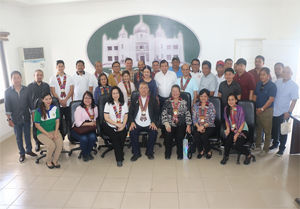 Sulu is an archipelagic province where fishing serves as its most important industry. The Sulu Sea supports the growth of the fishing industry since it is one of the richest fishing grounds in the Philippines. Most of the province’s marine commodities or resources comprise of diverse species of economically valued reef and pelagic fishes, marine invertebrates, shellfishes, seaweeds – some species of which are endemic in the area – that are important commodities for research and development (R&D).
Sulu is an archipelagic province where fishing serves as its most important industry. The Sulu Sea supports the growth of the fishing industry since it is one of the richest fishing grounds in the Philippines. Most of the province’s marine commodities or resources comprise of diverse species of economically valued reef and pelagic fishes, marine invertebrates, shellfishes, seaweeds – some species of which are endemic in the area – that are important commodities for research and development (R&D).
The highly-valued marine commodities of the Sulu province have been showcased during an official visit in Sulu of the Department of Science and Technology (DOST) led by Secretary Fortunato T. de la Peña, with officials of the DOST-Philippine Council for Agriculture, Aquatic and Natural Resources Research and Development (DOST-PCAARRD), and Destileria Limtuaco, & Co.
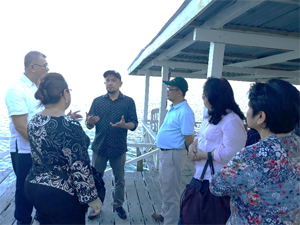 Secretary de la Peña was accompanied by Undersecretary for Research and Development Dr. Rowena Cristina L. Guevara and Undersecretary for DOST Regional Operations Dr. Brenda L. Nazareth-Manzano. Meanwhile, the PCAARRD and Destileria Limtuaco, & Co. delegations were headed by Acting Executive Director, Dr. Reynaldo V. Ebora and Ms. Olivia Limpe-Aw, respectively. The visit was held in cooperation with the provincial government of Sulu led by Governor Abdusakur M. Tan II.
Secretary de la Peña was accompanied by Undersecretary for Research and Development Dr. Rowena Cristina L. Guevara and Undersecretary for DOST Regional Operations Dr. Brenda L. Nazareth-Manzano. Meanwhile, the PCAARRD and Destileria Limtuaco, & Co. delegations were headed by Acting Executive Director, Dr. Reynaldo V. Ebora and Ms. Olivia Limpe-Aw, respectively. The visit was held in cooperation with the provincial government of Sulu led by Governor Abdusakur M. Tan II.
The visit serves as a significant opportunity to strengthen the DOST and PCAARRD’s presence in the province by identifying suitable Science and Technology (S&T) interventions and assistance that the agencies may provide as well as to initiate potential R&D collaborations with government agencies, private/non-government organizations, and academic institutions in Sulu.
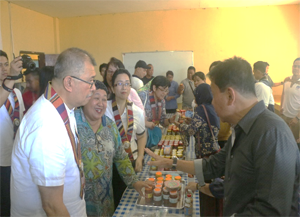
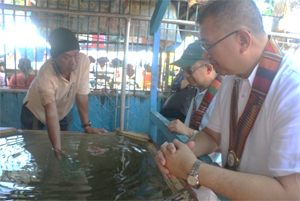
The team together with university researchers/project leaders from Mindanao, visited the College of Fisheries in Mindanao State University (MSU) Sulu Campus, where various technologies and processed marine products were showcased by the institution. The products included bottled sardines, danggit (dried siganid), seaweed candy, and bottled uyap (Acetes sp.), among others.
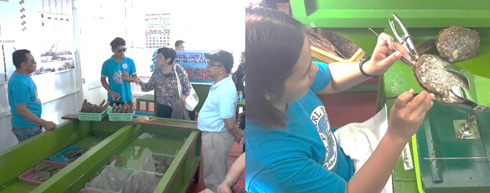 Local vendors near the fish landing site of Jolo, Sulu were selling various live species of marine invertebrates such as lobster, sea mantis, spanner crab, cuttlefish, squid, etc., and freshly-caught high-valued reef and pelagic fishes.
Local vendors near the fish landing site of Jolo, Sulu were selling various live species of marine invertebrates such as lobster, sea mantis, spanner crab, cuttlefish, squid, etc., and freshly-caught high-valued reef and pelagic fishes.
The province of Sulu contributes significantly to the country’s production of economically-valued seaweeds (Kappaphycus sp., Eucheuma sp.) for the local and international markets. The province’s seaweed farm or culture site is located in the municipality of Maimbung.
Local seaweed growers told PCAARRD-Marine Resources Research Division Director, Dr. Mari-Ann M. Acedera that the dried seaweeds (with no specific drying rate) are kept in the storehouses located in the adjacent town of Jolo before being shipped and sold to local buyers in Zamboanga, Cebu, and other provinces.
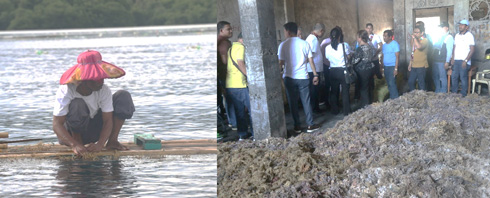 The highly-valued carrageenan is the processed form of seaweed, which is either sold locally or exported to other countries.
The highly-valued carrageenan is the processed form of seaweed, which is either sold locally or exported to other countries.
A pearl farm operates in the same municipality of Maimbung, which is an essential source of precious saltwater cultured pearls, and at the same time, generates livelihood for the Sulu fisherfolk.
These important commodities play a vital role in the biological diversity of Sulu’s marine resources and generation of employment in the province. It is a significant effort to plan and manage these resources to attain its sustainable utilization as well as food security. The recent visit of DOST and PCAARRD has documented the province’s significant assets worthy of S&T support.
